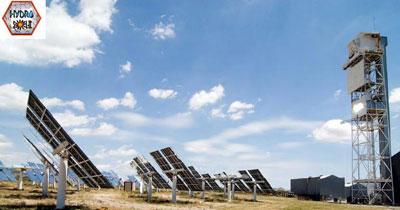Greeks get energy with the help of sun and water

That is, with the help of those elements, so to speak of solar energy and water, which are abundant in Greece. The principle is quite simple - thermal splitting of the water molecule with the subsequent selection of hydrogen. Well, with hydrogen it is already clear what you can do. Until now, the use of hydrogen in terms of obtaining energy has not been a particularly active area of alternative energy. There are two main reasons for this - the relative high cost of producing hydrogen (yes, and this despite the fact that hydrogen is the most common chemical element in the universe, that's irony) and the relative, again, danger of using hydrogen to generate energy by burning this gas. So, the Greeks found a relatively cheap way to extract hydrogen from water, solving the first problem.
The Greeks have long been working on the project "Hydrosol", which consists of several stages. Development has been going on since about 2002, when scientists began to look for a cheap way to get hydrogen from water. Then, experts searched for elements or their compounds that would allow water to split at a temperature of 800-1200 degrees Celsius. Such a material after a relatively long search was obtained - something like ceramic “honeycombs”, which are covered with ferrite structures with a lack of oxygen. This material also includes nickel and zinc, used as a catalyst.
')
The second stage of the project is the development of a solar thermal reactor where a water splitting reaction would occur. The reactor was created, its structure, of course, is not particularly advertised by scientists. However, it is known that the cost of producing hydrogen in such a reactor is about 10 Eurocent / kWh.
The third stage of the project is the launch of a full-fledged reactor producing hydrogen on an industrial scale. The reactor was tested in Spain, where it showed good results. The power of the reactor was 100 kW. Performance based on every 30 liters of water - 3 kilograms of hydrogen per hour. Experts estimate that this is the equivalent of thermal power of just 100 kW.
Now scientists are going to create a reactor with a capacity of 1 MW, while the reactor, according to the plan, will produce not only hydrogen, but also methane and methanol.
By the way, the budget of this project was only 3 million euros, and the results of the project are quite decent. Interestingly, how much would it take for domestic structures to develop such an idea? A couple of billions? Now the project is actively supported by the Greek government, so perhaps in a couple of years the Greeks will build their 1 MW solar-water reactor ...
Source: https://habr.com/ru/post/110159/
All Articles